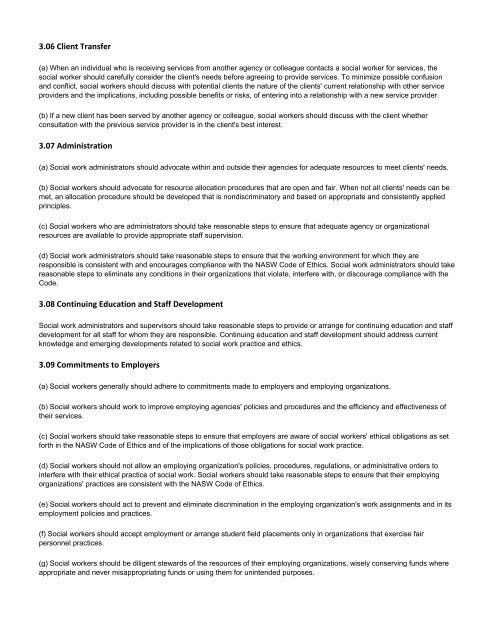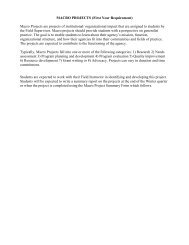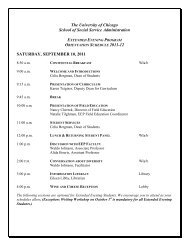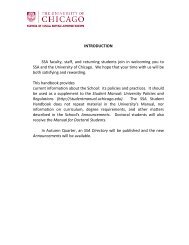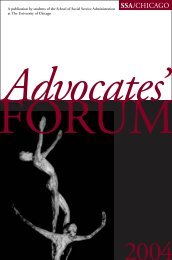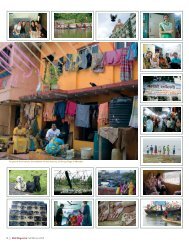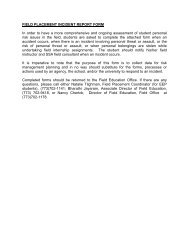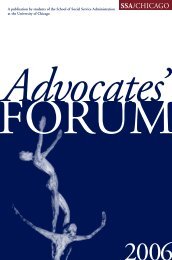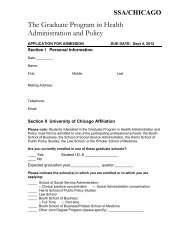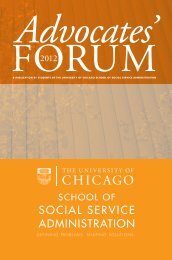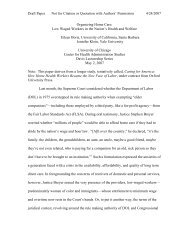The University of Chicago School of Social Service Administration
The University of Chicago School of Social Service Administration
The University of Chicago School of Social Service Administration
- No tags were found...
Create successful ePaper yourself
Turn your PDF publications into a flip-book with our unique Google optimized e-Paper software.
3.06 Client Transfer(a) When an individual who is receiving services from another agency or colleague contacts a social worker for services, thesocial worker should carefully consider the client's needs before agreeing to provide services. To minimize possible confusionand conflict, social workers should discuss with potential clients the nature <strong>of</strong> the clients' current relationship with other serviceproviders and the implications, including possible benefits or risks, <strong>of</strong> entering into a relationship with a new service provider.(b) If a new client has been served by another agency or colleague, social workers should discuss with the client whetherconsultation with the previous service provider is in the client's best interest.3.07 <strong>Administration</strong>(a) <strong>Social</strong> work administrators should advocate within and outside their agencies for adequate resources to meet clients' needs.(b) <strong>Social</strong> workers should advocate for resource allocation procedures that are open and fair. When not all clients' needs can bemet, an allocation procedure should be developed that is nondiscriminatory and based on appropriate and consistently appliedprinciples.(c) <strong>Social</strong> workers who are administrators should take reasonable steps to ensure that adequate agency or organizationalresources are available to provide appropriate staff supervision.(d) <strong>Social</strong> work administrators should take reasonable steps to ensure that the working environment for which they areresponsible is consistent with and encourages compliance with the NASW Code <strong>of</strong> Ethics. <strong>Social</strong> work administrators should takereasonable steps to eliminate any conditions in their organizations that violate, interfere with, or discourage compliance with theCode.3.08 Continuing Education and Staff Development<strong>Social</strong> work administrators and supervisors should take reasonable steps to provide or arrange for continuing education and staffdevelopment for all staff for whom they are responsible. Continuing education and staff development should address currentknowledge and emerging developments related to social work practice and ethics.3.09 Commitments to Employers(a) <strong>Social</strong> workers generally should adhere to commitments made to employers and employing organizations.(b) <strong>Social</strong> workers should work to improve employing agencies' policies and procedures and the efficiency and effectiveness <strong>of</strong>their services.(c) <strong>Social</strong> workers should take reasonable steps to ensure that employers are aware <strong>of</strong> social workers' ethical obligations as setforth in the NASW Code <strong>of</strong> Ethics and <strong>of</strong> the implications <strong>of</strong> those obligations for social work practice.(d) <strong>Social</strong> workers should not allow an employing organization's policies, procedures, regulations, or administrative orders tointerfere with their ethical practice <strong>of</strong> social work. <strong>Social</strong> workers should take reasonable steps to ensure that their employingorganizations' practices are consistent with the NASW Code <strong>of</strong> Ethics.(e) <strong>Social</strong> workers should act to prevent and eliminate discrimination in the employing organization's work assignments and in itsemployment policies and practices.(f) <strong>Social</strong> workers should accept employment or arrange student field placements only in organizations that exercise fairpersonnel practices.(g) <strong>Social</strong> workers should be diligent stewards <strong>of</strong> the resources <strong>of</strong> their employing organizations, wisely conserving funds whereappropriate and never misappropriating funds or using them for unintended purposes.


